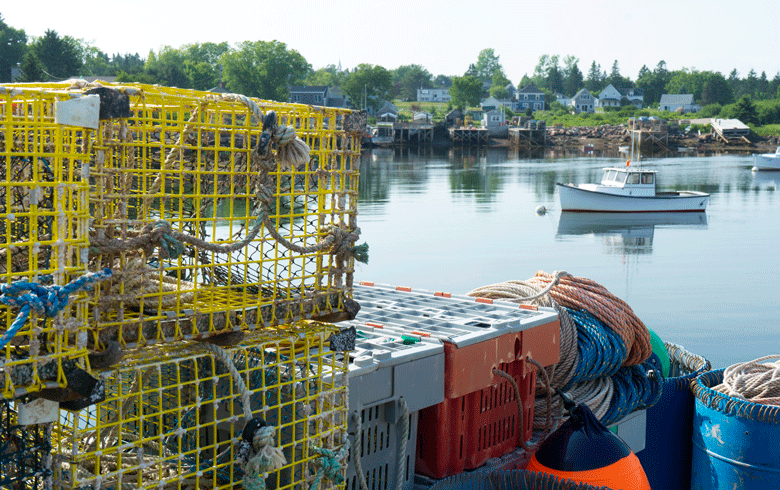A dire decline of North Atlantic right whales and a pair of court rulings are pushing regulators to propose new restrictions on lobstering in New England waters. The proposed regulations aim to reduce the risk of the endangered whales becoming entangled with lobster trap gear.
While much of the new proposed restrictions will not immediately impact lobstering in Maine state waters, the Maine Lobstermen’s Association is contesting another lawsuit that could hand down new restrictions off the state’s coast in the near future.
“They are prioritizing fishing, and they can’t do that.”
The Massachusetts Department of Marine Fisheries (MDMF) has proposed regulations that would ban lobstering from February to May in Massachusetts state waters to allow safe passage for the right whales as they migrate. The regulations would also reduce the amount of vertical trap lines in Massachusetts waters and require the use of trap lines that more easily break when an entanglement might occur, among other measures.
Massachusetts lobstermen have dealt with targeted closures and gear restrictions in the past, but this would be the first time that lobstering would be paused in all state waters for several months.
“Lobstermen have done everything they have been asked to protect right whales…”
“We proposed to go statewide, but we are reviewing comments we’ve received from the industry,” said Dan McKiernan, MDMF director. “We will be in a position to make a final recommendation to our marine fisheries advisory commission, and that meeting is scheduled on Jan. 28.”
In addition, the National Oceanic and Atmospheric Administration (NOAA) recently released proposed changes to its Atlantic Large Whale Take Reduction Plan that would affect lobstering in federal waters, stretching from Maine to Rhode Island. The regulations would require gear to be color coded by state, and lobstermen to use more traps between buoy lines and so-called “weak” rope. It would also increase the number of seasonal closures for buoy-line lobstering and crab fishing.
The new proposed regulations come in the wake of a pair of court rulings that found that Massachusetts and federal regulators have not adequately protected the endangered whales under the federal Endangered Species Act.
In a lawsuit arguing that Massachusetts regulators had failed to meet the law, U.S. District Judge Indira Talwani ruled in late April 2020 that the state of Massachusetts must apply for an incidental take permit. This special permit, required for legal activities that may result in the death of endangered animals, is scrutinized to ensure that all steps are taken to minimize the risk to the endangered species, and that any incidental death won’t reduce the likelihood of the survival of the species.
In a separate federal ruling in August 2020, U.S. District Judge James Boasberg ordered the National Marines Fishery Service to revise its rules for U.S. lobstering to include an incidental take statement when it comes to right whales, after he ruled that it had improperly left the statement out of a 2014 assessment.
The fishery service has a deadline of May 31 to submit the new regulations to Judge Boasberg. A similar lawsuit focused on Maine’s lobstering fishery is paused until that May 31 deadline has passed, since the judge overseeing the Maine case decided the two cases were similar, according to a blogpost from the Maine Lobstermen’s Community Alliance.
For years, regulators, conservationists, and stakeholders in the U.S. lobster industry have known that entanglement has been a significant threat to the endangered North Atlantic right whale population. The U.S. lobster industry has worked diligently to reduce the risk of entanglement, according to public comments by Patrice McCarron, executive director of the Maine Lobstermen’s Association.
“(U.S.) lobstermen have done everything they have been asked to protect right whales and remain committed to doing their part to save the species,” McCarron said in a statement posted to a webpage dedicated to raising legal funds to fight restrictions on the Maine lobster industry.
However, conservationists argue that federal and state regulators have not been meeting their responsibilities under the Endangered Species Act for years, and that more needs to be done now that the whale population has been in steep decline. There are now estimated to be only 70 breeding female North Atlantic right whales left, said Kristen Monsell, oceans program litigation director for the Center for Biological Diversity. Regulators too often favor commerce over the requirements of the law, she said.
“With respect to the fishery service management of the lobster fishery, they are not prioritizing right whales. They are prioritizing fishing, and they can’t do that,” Monsell said.
The plummeting number of whales and the new steps being proposed have left some in the lobster industry wondering if lobstering or the whales themselves may go extinct in the near future. In public meetings, Massachusetts lobstermen declared the proposed four-month ban on lobstering could put many in the state’s lobster industry out of business.
“I’m just trying to plan for the future of fisheries. I mean, if we have a closure this will really close down the state to any type of income,” said Massachusetts fisherman Mike Lane, according to a Massachusetts public radio report.
Others hold out hope that the lobster industry can adapt to share the waters with the endangered whales. To adapt, the lobster industry likely will need to continue to develop and utilize rope that can break free when entanglement occurs, as well as technology that can bring traps up to the surface without the use of vertical rope.
Currently, many in the lobster industry worry that such modifications are not ready for everyday use and are too expensive. Dr. Sean Todd, director of Allied Whale and a marine sciences professor at the College of the Atlantic, has long contended the new technologies will get better and more affordable if more people utilize it, and he remains hopeful for the future of the whales and the U.S. lobster industry.
“I think the two can coexist; I think it’s a matter of modified practices,” Todd said.





